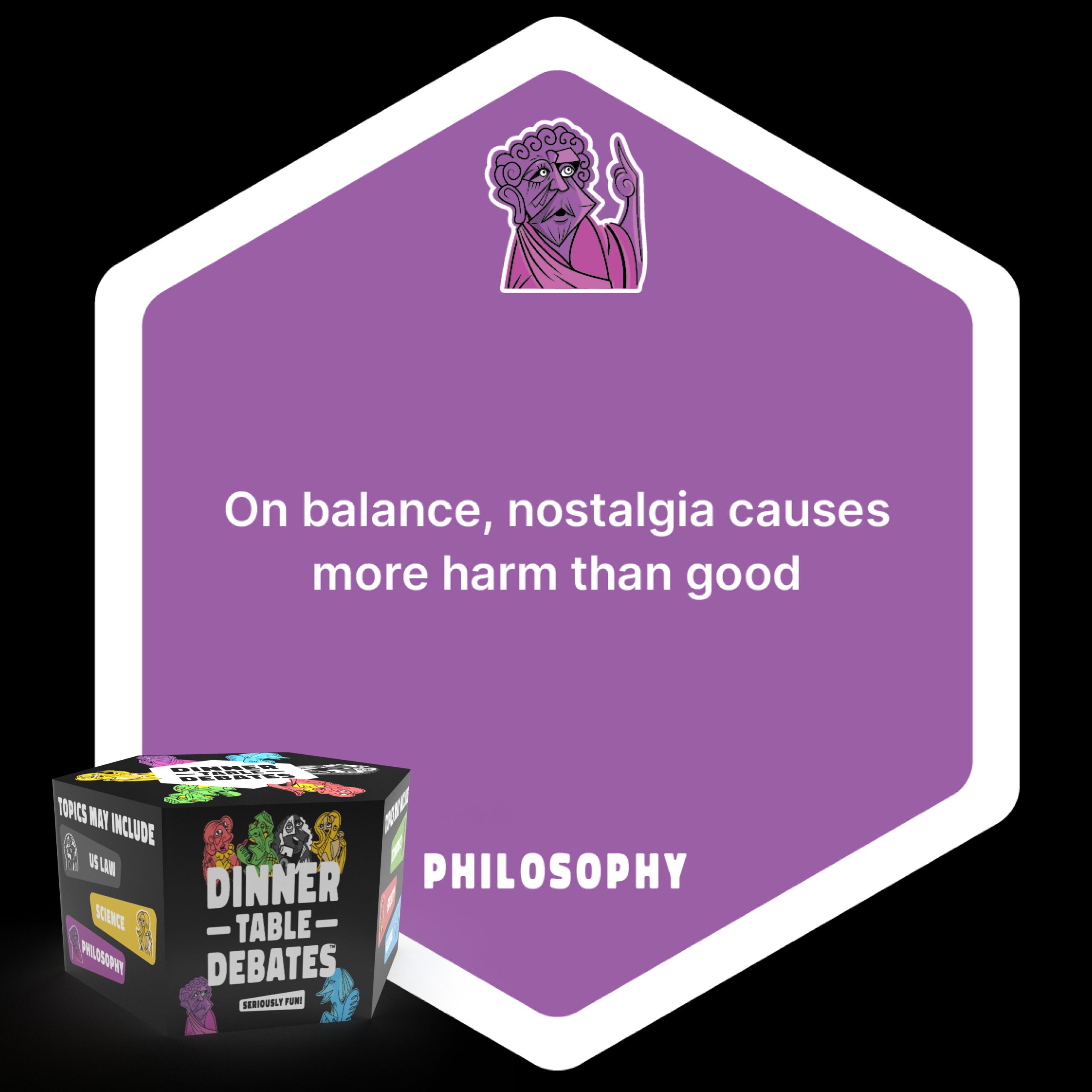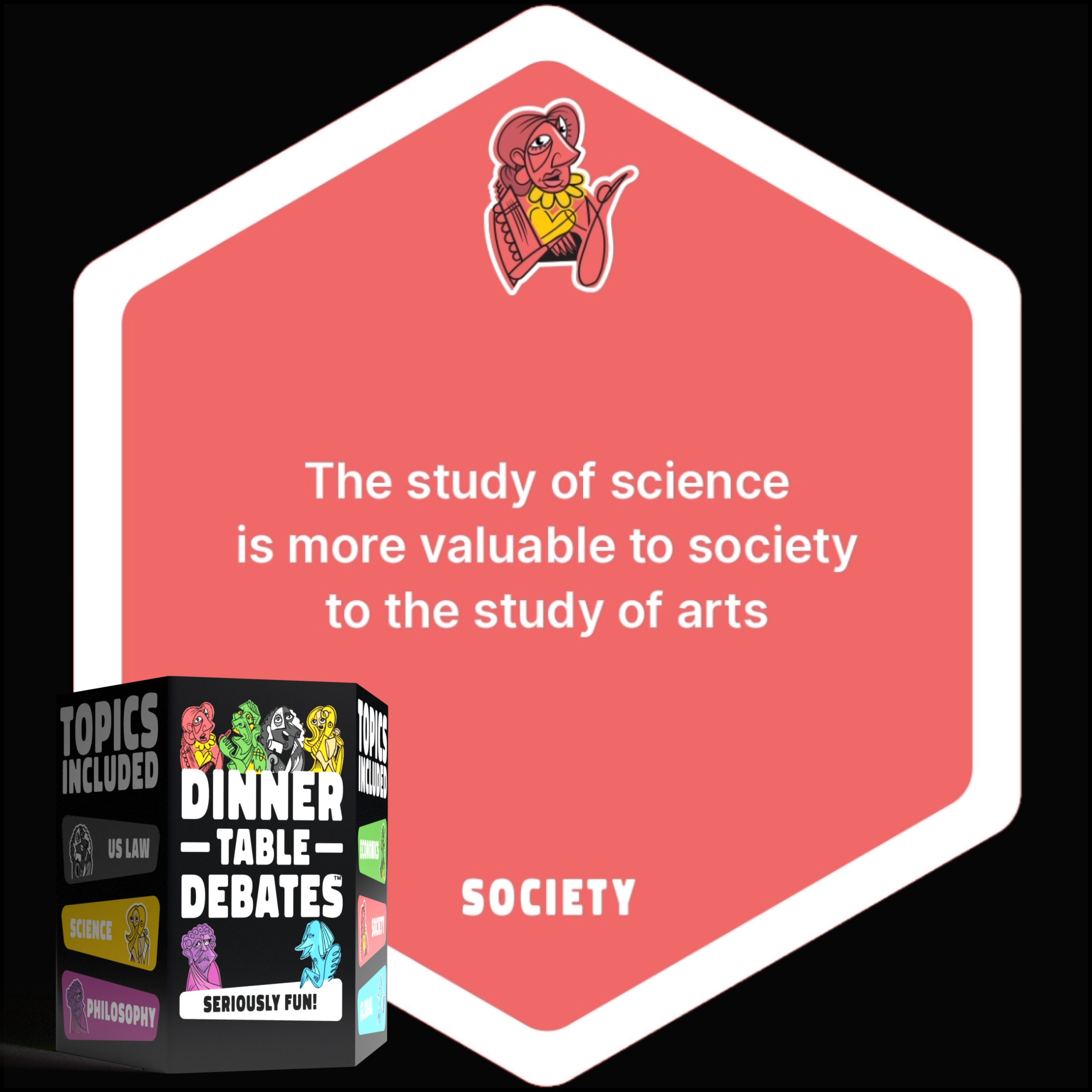What if you could live to see your great-great-grandchildren graduate? Or what if scientists discovered a way to keep your mind sharp and body youthful, no matter how many candles are on your birthday cake? Imagine a world where wrinkles fade, grey hair returns to its original color, and diseases associated with old age are a thing of the past. These aren’t just wild dreams—they’re questions at the forefront of cutting-edge scientific research. But should reversing aging be our top priority, above all other challenges facing humanity today?
Welcome to your Dinner Table Debates Daily Deep Dive, where we explore real topics from our decks and give you everything you need to debate, in under 10 minutes. Today's topic is Scientific research should prioritize the pursuit of reversing aging above all else and comes from our Full Size Essentials Collection deck.
Reversing aging isn’t just science fiction anymore—it’s a field called biogerontology, which focuses on understanding and potentially slowing or reversing the aging process. Scientists have already extended the lifespans of worms, mice, and other organisms in labs using techniques like genetic editing, caloric restriction, and cellular rejuvenation. This research gained momentum in the 20th century when breakthroughs in biology revealed how cellular processes, like DNA damage and protein misfolding, contribute to aging. Today, projects like the Hallmarks of Aging framework identify nine biological processes that drive aging and aim to target these for treatment. Funding for anti-aging research has also skyrocketed in recent years, with private investments exceeding billions. Companies like Altos Labs, backed by billionaires, are exploring therapies to regenerate cells, while organizations like the SENS Research Foundation aim to repair aging damage at its root.
Why does this matter? Aging is the single largest risk factor for many diseases like cancer, heart disease, and Alzheimer's. If scientists could slow or reverse aging, it might dramatically reduce the burden on healthcare systems, extend healthy lifespans, and transform how we live. On the other hand, prioritizing aging research raises ethical questions about resource allocation, inequality, and the purpose of life itself.
Over 70% of deaths worldwide are linked to diseases associated with aging, like heart disease and cancer. By targeting aging itself, we could prevent multiple illnesses rather than treating them individually. Research shows that extending healthy lifespans by just a few years could save trillions in healthcare costs globally. A healthier, longer-living population could transform economies. Imagine older adults staying in the workforce longer, contributing to innovation, and reducing the strain on social security systems. Studies suggest that extending life expectancy by just one year could add $38 trillion to the U.S. economy. Humanity has conquered many past challenges—curing infectious diseases, landing on the moon, and mapping the human genome. Reversing aging is a bold yet achievable goal that could define the next century. Pioneering this research could also position countries as global leaders in science and innovation.
However, other global crises demand attention. With climate change, pandemics, and poverty threatening billions, focusing solely on aging could neglect urgent problems. In 2021, 9.2% of the global population faced food insecurity. Diverting resources from these crises to anti-aging research might worsen inequality and suffering. Extending life could deepen societal divides. Anti-aging therapies would likely be expensive, accessible only to the wealthy, and exacerbate inequalities. Additionally, longer lifespans could strain resources like housing and jobs, creating unforeseen problems. Philosophically, aging is part of life’s cycle, creating space for younger generations and driving societal evolution. Interfering with this process could have profound and unpredictable consequences, from overpopulation to stagnation in cultural and generational renewal.
While curing aging might reduce the burden of diseases, it doesn’t guarantee equitable access. If anti-aging therapies are monopolized by wealthy individuals or nations, healthcare gaps could widen rather than shrink. On the other hand, prioritizing aging research doesn’t mean ignoring other problems. Scientific innovation often has a ripple effect; breakthroughs in anti-aging might also uncover treatments for diseases or ways to improve healthcare systems worldwide.
In recent years, scientists have achieved remarkable progress. In 2022, researchers rejuvenated the skin cells of a 53-year-old woman to resemble those of a 23-year-old. Clinical trials for drugs targeting aging mechanisms, like senolytics, are underway. Meanwhile, countries like Japan, with aging populations, are heavily investing in this research to address demographic challenges.
Want to dig into this topic even more? When you’re playing Dinner Table Debates at home, Agree gets to set the stage and choose how to define the debate. Here are some ways Agree could redefine this debate topic: Governments should fund reversing aging instead of private companies. How would public funding change the accessibility of treatments? Could governments prioritize ethical and societal concerns better than private industries? Anti-aging research should focus only on extending healthy lifespans, not total years lived. How do we define a "healthy lifespan"? Would this approach address concerns about overpopulation or inequality? Reversing aging should focus on mental health rather than physical health. Would targeting cognitive decline create better outcomes than focusing on physical rejuvenation? How could mental health innovations change society’s view on aging and productivity?
If you enjoyed our deep dive, you can debate this topic and many others by getting your own Dinner Table Debates deck at DinnerTableDebates.com. It's a unique game because every round starts with randomly assigning agree or disagree, then you pick the topic, meaning that you might be debating for something you disagree with or vice versa. But that's the point! Stretch your brain, gain clarity, improve critical thinking and empathy, and have fun doing it! Save 10% on your order when you use the code PODCAST10. You can also join the debate on our Instagram and TikTok accounts at DinnerTableDebates. Get ready for some thought-provoking discussions that will challenge your assumptions and broaden your understanding of the world around you! Happy debating and remember everyone is always welcome at the table.

Nostalgia: that warm, bittersweet feeling that can take you back to simpler times, like hearing an old song or flipping through childhood photos. But...

Do you remember the first time you solved a complex math problem—the satisfaction of finding the right answer? Or maybe you recall losing yourself...

Do you remember the last time someone said something so outrageous it left you questioning the boundaries of free speech? Maybe it was a...